The first lines of the Dhammapada
 Buddhadragon
Ehipassiko & Carpe DiemSamsara Veteran
Buddhadragon
Ehipassiko & Carpe DiemSamsara Veteran
The first lines of the Dhammapada point out the cause-effect relationship between a person's thoughts and their experience of reality.
Or how the ethical colour of our thoughts create our subjective experience of the world.
These are some of the different translations that can be found on different forums online:
Mind is the forerunner of (all evil) states.
Mind is chief; mind-made are they.
If one speaks or acts with wicked mind, because of that,
suffering follows one, even as the wheel follows the hoof of the draught-ox.
(Narada)Phenomena are preceded by the heart,
ruled by the heart,
made of the heart.
If you speak or act
with a corrupted heart,
then suffering follows you —
as the wheel of the cart,
the track of the ox
that pulls it.
(Thanissaro)All mental phenomena have mind as their forerunner;
they have mind as their chief; they are mind-made.
If one speaks or acts with an evil mind, 'dukkha'
follows him just as the wheel follows the hoofprint of the ox that draws the cart.
(Daw Mya Tin)All that we are is the result of what we have thought:
it is founded on our thoughts, it is made up of our thoughts.
If a man speaks or acts with an evil thought, pain follows him,
as the wheel follows the foot of the ox that draws the carriage.
(Müller)Mind precedes its objects.
They are mind-governed and mind-made.
To speak or act with a defiled mind is to draw pain after oneself,
like a wheel behind the feet of the animal drawing it.
(John Richards)We are what we think.
All that we are arises with our
thoughts.
With our thoughts we make the world.
Speak or act with an impure mind
And trouble will follow you
As the wheel follows the ox that draws
the cart.
(Byrom)Mind creates the world;
what you see arises with your thoughts.
If you speak and act with a confused mind,
trouble will follow you as certainly
as a cart follows the ox that pulls it.
(Mitchell)All experience is preceded by mind,
Led by mind,
Made by mind.
Speak or act with a corrupted mind,
And suffering follows
As the wagon wheel follows the hoof of the ox.
All experience is preceded by mind,
Led by mind, Made by mind.
Speak or act with a peaceful mind,
And happiness follows
Like a never-departing shadow.
(Gil Fronsdal)
Different conclusions have been that we are the result of what we have thought, that we are shaped by our thoughts and become what we think, that our life is shaped by our mind.
Or that it is mind that shapes action: our volitional thoughts precede our deeds.
Bodhipaksa concludes:
"Thoughts arise, are the root, which we need to address, to transform our suffering into happiness."
I find these verses to be a key Buddhist teaching in how the choice from dukkha to sukkha lies solely in our mind, in our subjective perception of reality, in our steadfast development of insight, in our disciplined practice to attain some makeshift wisdom.
And cessation of dukkha lies solely within us, not outside ourselves.
As it is, Dukkha is in the eye of the beholder.
???


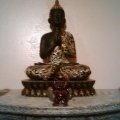




Comments
The second one —the one that suits me best! Direct and simply elegant.>
@DhammaDragon said:
Very Deep.
We shouldn't read too much into it. Those things were written a long time ago. Neuroscience has confirmed that the brain automatically processes information using thought, imagination, etc. Control is possible, but only for a specific duration. It can't be sustained.
Who is the controller @techie ?
Just to add two more to the mix;
Our life is shaped by our mind; we become
what we think. Suffering follows an evil thought as the wheels of a cart follow the oxen that draw it.
Our life is shaped by our mind; we become
what we think. Joy follows a pure thought like a shadow that never leaves.
(Eknath Easwaran)
Preceded by mind
are phenomena,
led by mind,
formed by mind.
If with mind polluted
one speaks or acts,
then pain follows,
as a wheel follows
the draft ox's foot.
Preceded by mind
are phenomena,
led by mind,
formed by mind.
If with mind pure
one speaks or acts,
then ease follows,
as an ever present shadow.
(Glenn Wallis)
Right now I am reminded of someone I know that keeps getting screwed over, always has issues with her family and can't find a good guy to settle down with even as she claims she is seeking one.
Today her profile was her giving us all the finger.
Didn't that new age Law of Attraction kind of run off of this?
Would it be fair to say you're doubting the Buddha's enlightenment?
It would be fair to say he speaks even before allowing himself the process of thinking, processing or digesting.
The words may be ancient; their truth is timeless, ageless and about as much a bullseye as you could get.
Have you tried telling HHDL that? Or even this guy?
Contact them. Let them know.
Good luck with that...
Is there a controller? According to Buddha as well as neuroscience, there is none. There are thoughts, no thinker. So far so good. But what the buddha says in the OP ... it sort of contradicts this truth. Which is why I said, we can accept his teachings insofar as it doesn't contradict neuroscience. Even the Dalai lama weighs the teaching against science.
No, be accurate. What the Dalai Lama actually said was:
"If scientific analysis were conclusively to demonstrate certain claims in Buddhism to be false, then we must accept the findings of science and abandon those claims.”
Nothing you claim has apparently done so, or otherwise those claims would be abandoned.
And he's pretty up-front about that.
So @techie, putting your premise forward as something we can work on - how do you incorporate it into your life on a daily basis? How do you, in accordance with what you state, continue your day-to-day existence?
How does it help you interact with others and help your progress on the Buddhist path?
This is, after all, why you're here, isn't it?
To explore, discuss and live by Buddhist principles?
“Meditation is not just blissing out under a mango tree. It completely changes your brain and therefore changes what you are.”
“Another form of laziness is thinking: ‘That’s not for me; it’s beyond my abilities. I’d rather not get involved with it.’ In other words, you give up the race before you reach the starting line.”
“Few of us would regret the years it takes to complete an education or master a crucial skill. So why complain about the perseverance needed to become a well-balanaced and truly compassionate human being?”
-Ibid
Just sayin'....
Sorry but no, @techie.
Neuroscience, psychology, quantum physics back up knowledge that Buddhism has been upholding for a couple plus millennia.
http://www.openculture.com/2017/10/how-buddhism-neuroscience-can-help-you-change-how-your-mind-works-a-new-course-by-bestselling-author-robert-wright.html
http://www.sbs.com.au/news/article/2015/09/21/comment-neuroscience-backs-buddhist-belief-self-isnt-constant-ever-changing
http://www.univie.ac.at/constructivism/archive/fulltexts/2417.html
https://www.huffingtonpost.com/david-loy/what-buddhism-and-psychot_b_5549963.html
http://www.buddhanet.net/psymed1.htm
His HH the Dalai Lama is part of an organization called Mind and Life, where different scientists and spiritual thinkers strive to find common ground between knowledge from Buddhism and science.
https://www.mindandlife.org/mind-and-life-dialogues/
Daniel Goleman's brilliant book "Destructive Emotions" and Paul Ekman's "Emotional Awareness" are but simple examples of how the way we use our mind sheds different perceptions of reality, and how we can train our mind to think in more skillful ways.
Absolutely.
How you perceive reality -and create your reality- has a lot to do with the thoughts you choose to nourish and that you use as personal sieve to filter the world.
Choose unskilful (new agey: negative) thoughts, dukkha follows.
Choose skillful (new agey: uplifting) thoughts, no dukkha.
I would bet your friend is creating lots of dukkha for herself...
Awesome post @DhammaDragon . Thank you for sharing. Brilliant to take it back to the opening lines of the Dhammapada. Simple yet profound truth. As a scientist I have no issues with buddhist truths whatsoever. The proof is in the pudding/practise.
@techie I disagree with you entirely on this one but much Metta to you. We can agree to disagree.
This is the one extreme of nihilism but it isn't what Buddha taught I don't think. It isn't that there is no controller, it's that the distinction is an illusion. The controller and the controlled are aspects of the same process and as such, both are present in the action.
Control is limited but developing skillful means of living would be impossible without it.
As for neuroscience, I'd need to see something that's passed peer review because I doubt there are too many conclusions in the field claiming people have absolutely no control over our lives.
That reasoning is based on faulty premise on two accounts... or is that three?
Three I think. What Buddha taught, what H.H. said and the findings of neuroscience.
As for clarity & concision, I'm liking John Richards. I looked him up. He was an Anglican priest who served in Wales and died this year. I'm looking for an epub of his translation, but might have to settle for pdf.
Indeed.
We have karma and beneficial conduct/virtue.
Initially this is about filtering and mind focus. In other words practice choice.
However on a more subtle level we may let go of the need for good karma, and even our desire for peace of mind. In other words a Boddhisatva may generate 'difficulties' for themselves as a result of others great needs and getting involved with their mind stream ...
Thus have I heard:
Thus have I also heard:
By Buddhism’s standards we can accept the Buddha’s teachings only through personal verification, but scientific standards require peer review and personal experience can’t be peer reviewed, so his teachings are outside the scope of science.
I don't think that makes the two incompatible. They just cover different areas, sometimes intersecting. Ultimately, though, science aims to understand, as best we can, what the world is and how it works; whereas Buddhism guides us through various means to see for ourselves what it’s not.
These are actually good mantra verses. 1-3,8 are good. Not too much to say they are too the point and very true.
I have several versions and love to compare similarities and differences.
My favourites, for whatever reason, are Max Müller's (I have the 1872, 1881 and 1924 editions) and Bhikkhu Silacara's (1915).
The most recent I have are Gil Fronsdal's (not in the picture) and Ananda Maitreya's.
Then, Narada Thera's (1959), Albert J. Edmunds' (1902) and Wagiswara's (1920).
The most curious, and rarer, is the book with the green cover: Samuel Beal's Chinese Dhammapada (1878), with similar material but in different chapter order, and supplemented with more information than the traditional Dhammapada.
Walpola Rahula and Christmas Humphreys have some good selections, though not complete translations.
Some years ago, I posted a thread on neural plasticity.
Maybe @techie would find it useful:
http://newbuddhist.com/discussion/22183/is-delusion-hardwired#latest
I recently ordered a copy (Gil Frondsal) as it comes highly recommended.
Fronsdal's is a pretty good version, Fede.
But I do love my Max Müller and Bhikkhu Silacara versions beyond reason....
I like the way the men in Jane Austen (who will not say they love inanimate things) express their strong affinities: "I am excessively fond of [cottages].
I adore Jane Austen's books.
And I do love inanimate things too.
Though in this case, Max Müller and Bhikkhu Silacara are more like dear old friends to me.
Let's say I love them as well as the books they translated
I like Gay Watson's take on the "Twin Verses" in her "The Dialogue Between Buddhism, Psychotherapy and the Mind Sciences"
I think I agree with you on the science. But people change, their mental states and dispositions change. If the mind is what the brain is doing then it must be the brain that is changing.
It can be repeated though, and when repeated enough it gradually becomes habit.
My first introduction to the "Dhammapada" was when I was giving this illustrated copy from a Taiwanese nun from a Buddhist temple I was contracted to do some work at in Auckland, (that was almost 20 years ago )...I was wandering around their library and asked if there were any books in English and a nun lead me to this book, she "gave" me the book... after which I did donate some money...It's quite a large book, "A" 4 size pages and quite heavy...I have had a few different copies since then, but this one stands out and is one of my 'favourites' ...(if Buddhist practitioners can have favourites
)...I was wandering around their library and asked if there were any books in English and a nun lead me to this book, she "gave" me the book... after which I did donate some money...It's quite a large book, "A" 4 size pages and quite heavy...I have had a few different copies since then, but this one stands out and is one of my 'favourites' ...(if Buddhist practitioners can have favourites  )
)
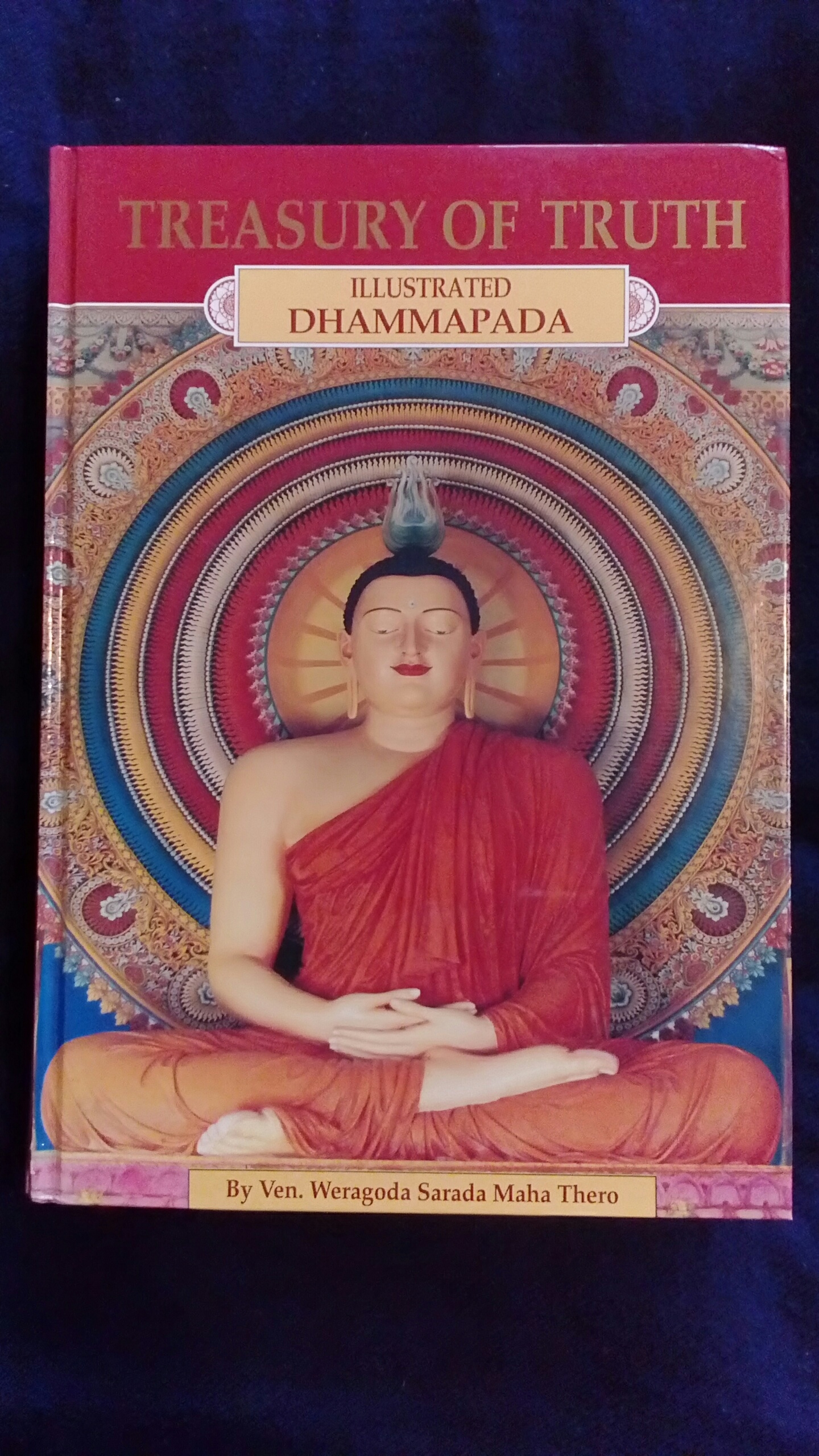
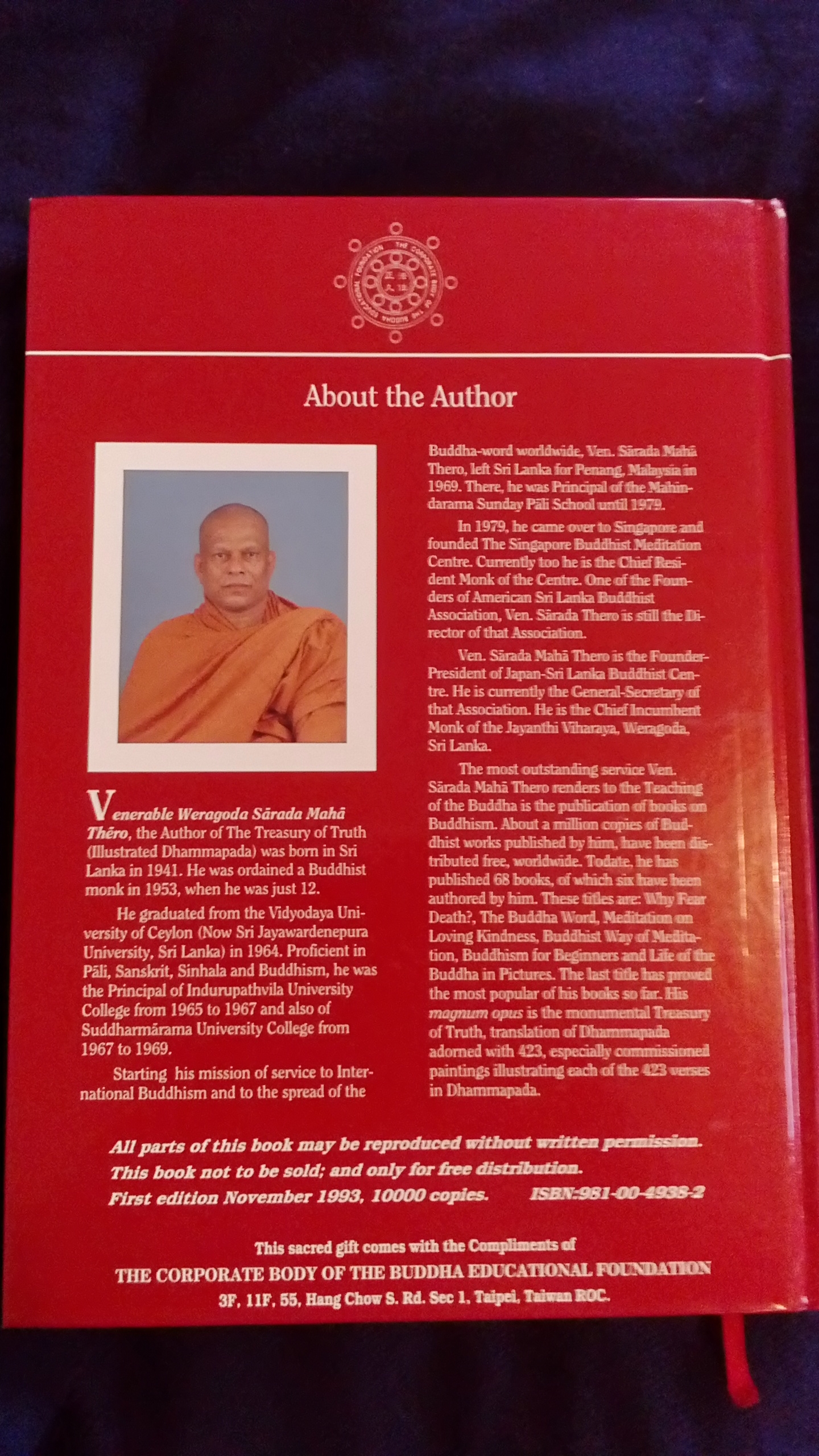
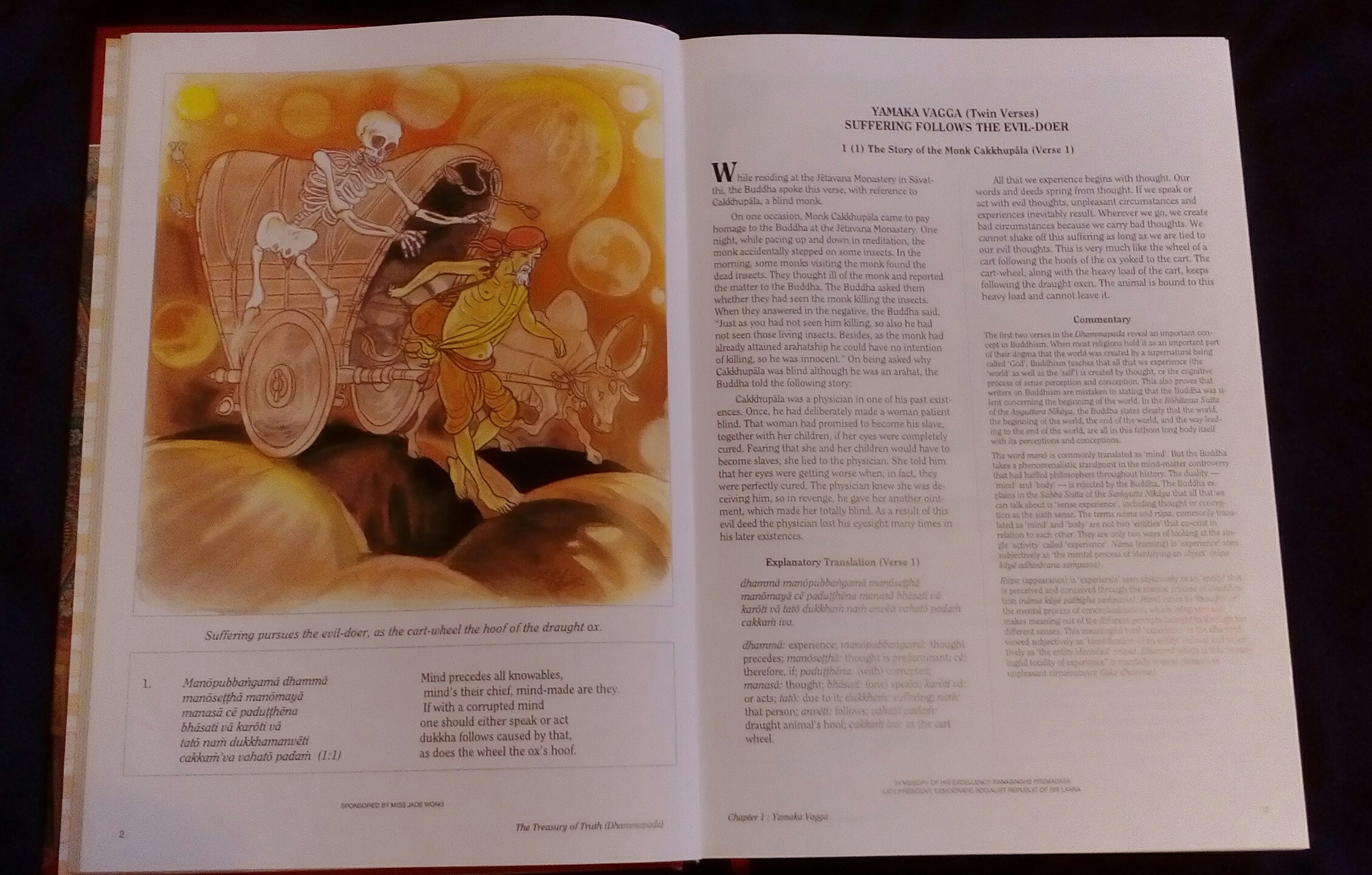
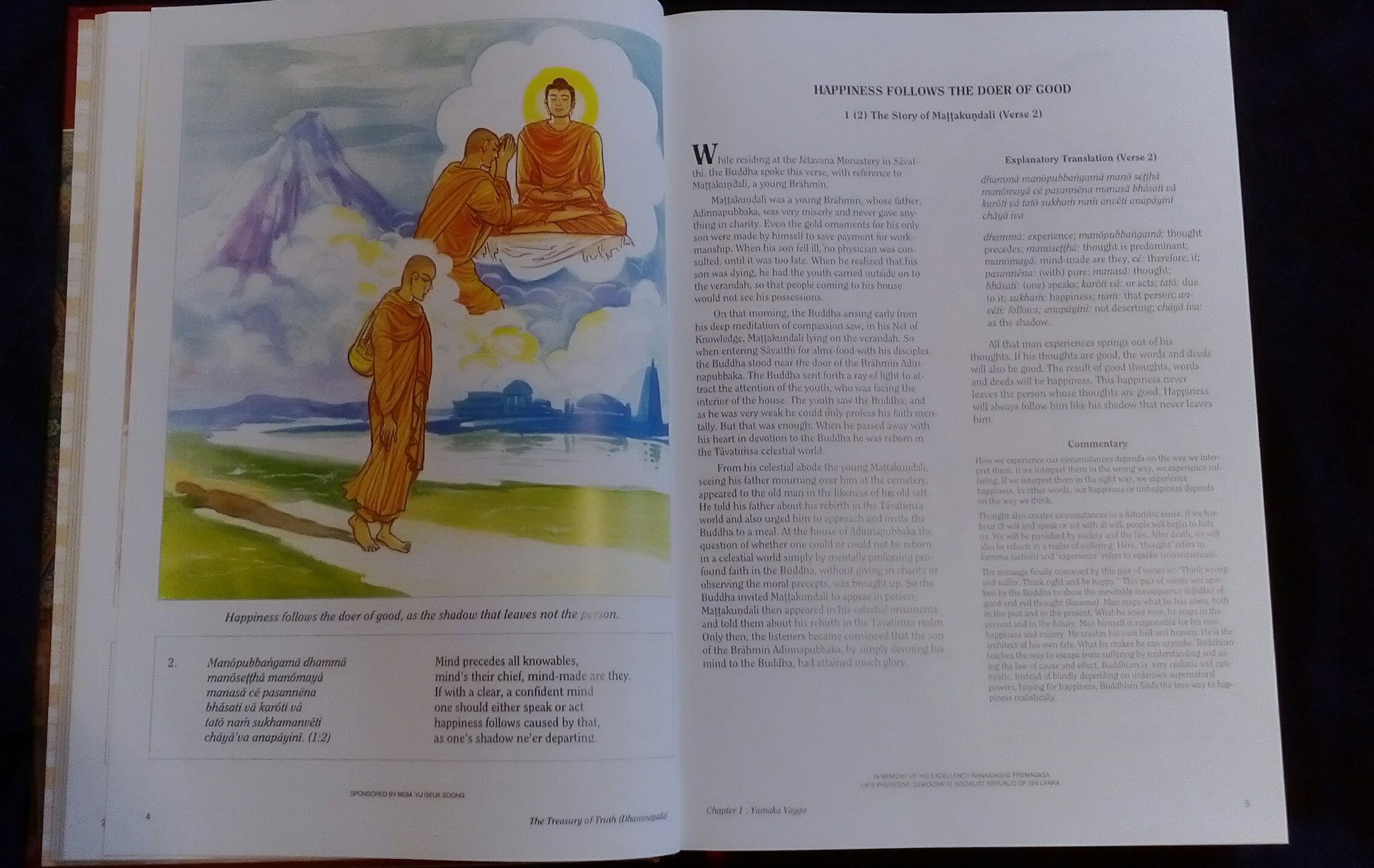
^ Absitively, Posolutely Beauteous! Thanks!
I thought I would share the introduction from one of the versions that I have, by W.D.C Wagiswara and K.J. Saunders (1920):
The authors compare the Buddha's line of thinking to Stoicism:
"Men are disturbed, not by things, but by the view they take of things"
(Epictetus)